Introduction to the World of Computers--计算机世界简介课件
- 格式:ppt
- 大小:7.98 MB
- 文档页数:3
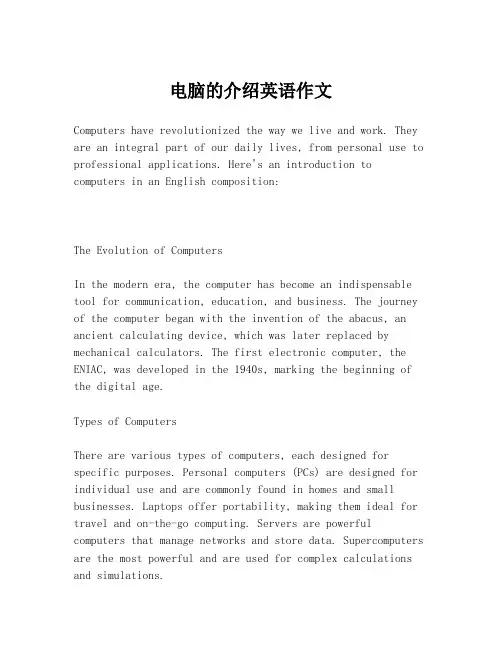
电脑的介绍英语作文Computers have revolutionized the way we live and work. They are an integral part of our daily lives, from personal use to professional applications. Here's an introduction to computers in an English composition:The Evolution of ComputersIn the modern era, the computer has become an indispensable tool for communication, education, and business. The journey of the computer began with the invention of the abacus, an ancient calculating device, which was later replaced by mechanical calculators. The first electronic computer, the ENIAC, was developed in the 1940s, marking the beginning of the digital age.Types of ComputersThere are various types of computers, each designed for specific purposes. Personal computers (PCs) are designed for individual use and are commonly found in homes and small businesses. Laptops offer portability, making them ideal for travel and on-the-go computing. Servers are powerful computers that manage networks and store data. Supercomputers are the most powerful and are used for complex calculations and simulations.Components of a ComputerA computer system consists of several key components. The central processing unit (CPU) is the brain of the computer, executing instructions and performing calculations. The memory (RAM) stores data temporarily during operation.Storage devices, such as hard drives and solid-state drives (SSDs), hold data and programs. The motherboard connects all the components and provides the platform for expansion. Input devices like keyboards and mice allow users to interact with the computer, while monitors and printers are output devices that display and print information.Software and Operating SystemsSoftware is the set of instructions that tell the computer what to do. Operating systems, such as Windows, macOS, and Linux, manage the computer's resources and provide a user interface. Applications, or apps, are programs designed for specific tasks, like word processing, web browsing, or gaming.Networking and the InternetComputers have transformed the way we communicate through networking. Local Area Networks (LANs) connect computerswithin a building or campus, while the Internet connects computers worldwide. The Internet has become a platform for social interaction, commerce, and the sharing of information.Security and PrivacyWith the increasing reliance on computers, security and privacy have become critical issues. Viruses, malware, and hacking are threats that can compromise data and systems. Antivirus software, firewalls, and secure coding practices are essential to protect against these threats.Future of ComputingThe future of computing is promising, with advancements in artificial intelligence, quantum computing, and the Internet of Things (IoT). These technologies are set to make computers even more powerful and integrated into every aspect of our lives.In conclusion, computers have come a long way since their inception. They are now an essential part of our society, driving innovation and shaping the future. Understanding the basics of computers is crucial for anyone looking to navigate the digital world effectively.This composition provides a comprehensive overview of computers, touching on their history, types, components, software, networking capabilities, security concerns, and future prospects.。
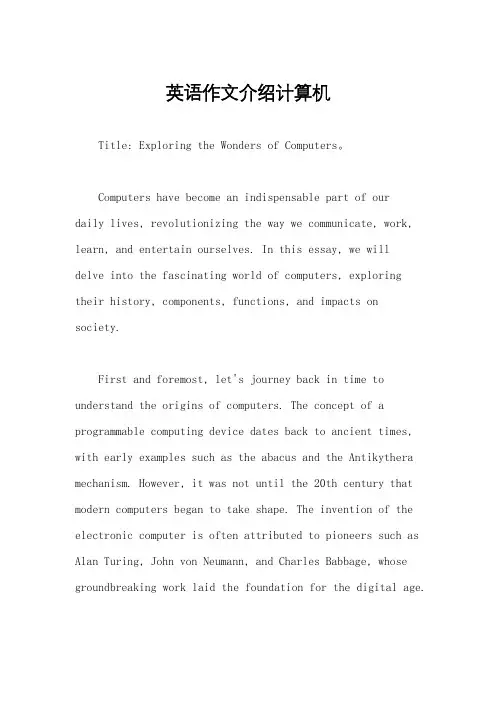
英语作文介绍计算机Title: Exploring the Wonders of Computers。
Computers have become an indispensable part of ourdaily lives, revolutionizing the way we communicate, work, learn, and entertain ourselves. In this essay, we willdelve into the fascinating world of computers, exploring their history, components, functions, and impacts on society.First and foremost, let's journey back in time to understand the origins of computers. The concept of a programmable computing device dates back to ancient times, with early examples such as the abacus and the Antikythera mechanism. However, it was not until the 20th century that modern computers began to take shape. The invention of the electronic computer is often attributed to pioneers such as Alan Turing, John von Neumann, and Charles Babbage, whose groundbreaking work laid the foundation for the digital age.At the heart of every computer lies its hardware components. These include the central processing unit (CPU), which serves as the brain of the computer, processing instructions and performing calculations; memory modules, such as RAM and ROM, which store data and programs temporarily or permanently; storage devices, such as hard disk drives and solid-state drives, which retain data even when the power is turned off; input devices, like keyboards and mice, which allow users to interact with the computer; and output devices, such as monitors and printers, which display information and produce tangible results.In addition to hardware, computers rely on software to perform tasks and execute commands. Software can be broadly categorized into two types: system software and application software. System software includes operating systems like Windows, macOS, and Linux, which manage the computer's hardware resources and provide a platform for running other software. Application software, on the other hand, consists of programs designed to perform specific tasks, such asword processing, web browsing, graphic design, and gaming.One of the most remarkable features of computers istheir versatility and programmability. Unlike traditional machines, which perform a single predefined function, computers can be programmed to perform a wide range of tasks, from simple calculations to complex simulations.This flexibility has led to the development of various programming languages, such as Python, Java, C++, and JavaScript, each tailored to different purposes and preferences.The impact of computers on society cannot be overstated. They have revolutionized countless industries, from healthcare and education to finance and entertainment. In healthcare, computers aid in diagnosis, treatment planning, and medical research, leading to improved patient outcomes and faster advancements in the field. In education, computers facilitate distance learning, interactive tutorials, and personalized instruction, making education more accessible and engaging for learners of all ages. In finance, computers enable real-time trading, risk analysis, and algorithmic trading, driving innovation and efficiencyin the financial markets. In entertainment, computers powerimmersive gaming experiences, virtual reality simulations, and digital content creation, reshaping the way we play, create, and consume media.However, along with their many benefits, computers also raise concerns about privacy, security, and digital divide. The widespread use of computers and the internet has led to an unprecedented amount of personal data being collected, stored, and analyzed, raising questions about individual privacy and data protection. Moreover, the interconnected nature of computer networks makes them vulnerable to cyber attacks, malware infections, and data breaches, posing threats to both individuals and organizations. Additionally, the digital divide persists, with disparities in access to computers and the internet between different regions, socioeconomic groups, and demographics, exacerbating inequalities and limiting opportunities for those left behind.In conclusion, computers have profoundly transformedour world, shaping the way we work, communicate, and live. From their humble beginnings as mechanical calculators totheir present-day ubiquity as powerful digital machines, computers continue to evolve and innovate, driving progress and shaping the future of humanity. As we navigate the complexities of the digital age, it is essential to harness the potential of computers responsibly, ensuring that they serve the common good and empower individuals and communities worldwide.。
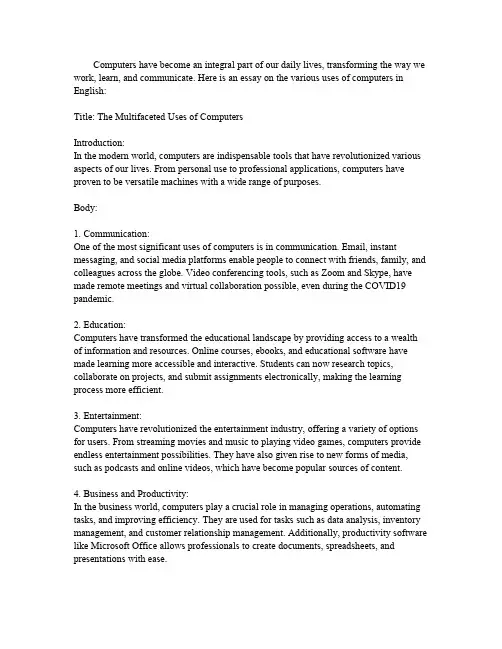
Computers have become an integral part of our daily lives,transforming the way we work,learn,and communicate.Here is an essay on the various uses of computers in English:Title:The Multifaceted Uses of ComputersIntroduction:In the modern world,computers are indispensable tools that have revolutionized various aspects of our lives.From personal use to professional applications,computers have proven to be versatile machines with a wide range of purposes.Body:munication:One of the most significant uses of computers is in communication.Email,instant messaging,and social media platforms enable people to connect with friends,family,and colleagues across the globe.Video conferencing tools,such as Zoom and Skype,have made remote meetings and virtual collaboration possible,even during the COVID19 pandemic.cation:Computers have transformed the educational landscape by providing access to a wealth of information and resources.Online courses,ebooks,and educational software have made learning more accessible and interactive.Students can now research topics, collaborate on projects,and submit assignments electronically,making the learning process more efficient.3.Entertainment:Computers have revolutionized the entertainment industry,offering a variety of options for users.From streaming movies and music to playing video games,computers provide endless entertainment possibilities.They have also given rise to new forms of media, such as podcasts and online videos,which have become popular sources of content.4.Business and Productivity:In the business world,computers play a crucial role in managing operations,automating tasks,and improving efficiency.They are used for tasks such as data analysis,inventory management,and customer relationship management.Additionally,productivity software like Microsoft Office allows professionals to create documents,spreadsheets,and presentations with ease.5.Research and Development:Computers have become essential tools for researchers and scientists.They enable complex calculations,simulations,and data analysis,which are vital for scientific advancements.In fields such as medicine,engineering,and environmental science, computers have contributed to breakthroughs and innovations.6.Creative Expression:For artists and designers,computers offer a digital canvas to create and edit various forms of art.Graphic design software,3D modeling tools,and digital illustration programs allow creators to bring their ideas to life.Musicians can also use computers to compose, record,and produce music using digital audio workstations.7.Ecommerce and Online Shopping:The rise of ecommerce has made shopping more convenient than puters enable users to browse products,compare prices,and make purchases online.This has led to the growth of online marketplaces and the expansion of businesses beyond traditional brickandmortar stores.Conclusion:In conclusion,computers have a myriad of uses that extend beyond simple data processing.They have become essential tools for communication,education, entertainment,business,research,creative expression,and ecommerce.As technology continues to advance,it is likely that the applications of computers will only continue to grow and evolve,further shaping our world in unprecedented ways.。
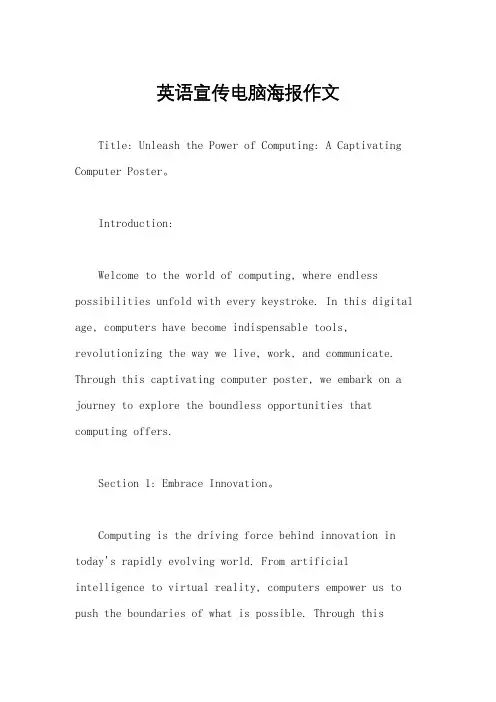
英语宣传电脑海报作文Title: Unleash the Power of Computing: A Captivating Computer Poster。
Introduction:Welcome to the world of computing, where endless possibilities unfold with every keystroke. In this digital age, computers have become indispensable tools, revolutionizing the way we live, work, and communicate. Through this captivating computer poster, we embark on a journey to explore the boundless opportunities that computing offers.Section 1: Embrace Innovation。
Computing is the driving force behind innovation in today's rapidly evolving world. From artificial intelligence to virtual reality, computers empower us to push the boundaries of what is possible. Through thisposter, we celebrate the spirit of innovation and encourage viewers to embrace the endless possibilities that computing presents.Section 2: Connect Globally。
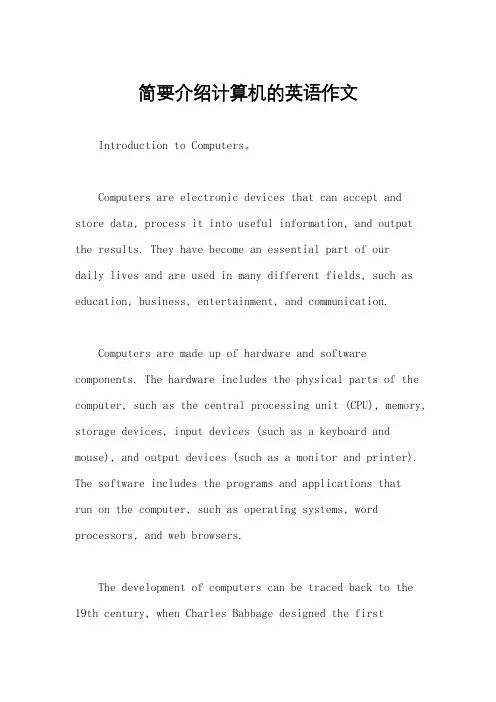
简要介绍计算机的英语作文Introduction to Computers。
Computers are electronic devices that can accept and store data, process it into useful information, and output the results. They have become an essential part of ourdaily lives and are used in many different fields, such as education, business, entertainment, and communication.Computers are made up of hardware and software components. The hardware includes the physical parts of the computer, such as the central processing unit (CPU), memory, storage devices, input devices (such as a keyboard and mouse), and output devices (such as a monitor and printer). The software includes the programs and applications thatrun on the computer, such as operating systems, word processors, and web browsers.The development of computers can be traced back to the 19th century, when Charles Babbage designed the firstmechanical computer. However, it wasn't until the mid-20th century that electronic computers were invented, and they quickly became more powerful and efficient. The first personal computer (PC) was introduced in the 1970s, and since then, computers have become smaller, faster, and more affordable.Computers have many advantages, such as their speed and accuracy in processing data, their ability to store large amounts of information, and their versatility in performing different tasks. They have revolutionized the way we work, communicate, and learn, and have opened up newopportunities for innovation and creativity.However, computers also have some disadvantages, such as their potential to cause addiction and social isolation, their vulnerability to viruses and hacking, and their impact on the environment due to electronic waste and energy consumption.In conclusion, computers are powerful tools that have transformed the way we live and work. They have bothadvantages and disadvantages, and it is important to use them responsibly and ethically. As technology continues to evolve, it is likely that computers will become even more integrated into our daily lives, and it is up to us to ensure that they are used for the greater good.。
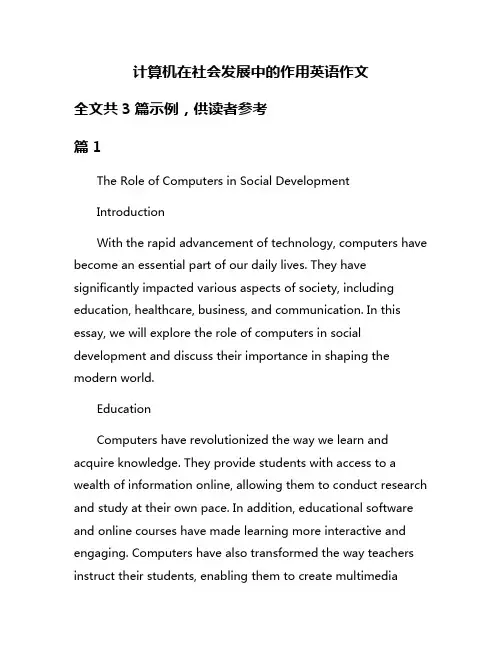
计算机在社会发展中的作用英语作文全文共3篇示例,供读者参考篇1The Role of Computers in Social DevelopmentIntroductionWith the rapid advancement of technology, computers have become an essential part of our daily lives. They have significantly impacted various aspects of society, including education, healthcare, business, and communication. In this essay, we will explore the role of computers in social development and discuss their importance in shaping the modern world.EducationComputers have revolutionized the way we learn and acquire knowledge. They provide students with access to a wealth of information online, allowing them to conduct research and study at their own pace. In addition, educational software and online courses have made learning more interactive and engaging. Computers have also transformed the way teachers instruct their students, enabling them to create multimediapresentations and interactive lessons that cater to different learning styles. Overall, computers have greatly enhanced the quality and accessibility of education, leveling the playing field for students of all backgrounds.HealthcareIn the field of healthcare, computers have streamlined processes and improved patient care. Electronic health records have made it easier for healthcare providers to access and update patient information, leading to more coordinated and efficient care. Medical imaging technology, such as MRIs and CT scans, have also become indispensable tools for diagnosing and treating diseases. With the help of computers, doctors can now perform complex surgeries with greater precision and accuracy. Telemedicine, which allows patients to consult with healthcare providers remotely, has become increasingly popular, especially in rural areas where access to healthcare is limited. In short, computers have played a crucial role in advancing medical technology and improving healthcare outcomes.BusinessComputers have revolutionized the way businesses operate and compete in today's global economy. They have automated repetitive tasks, such as data entry and inventory management,freeing up employees to focus on more strategic initiatives. Online shopping and e-commerce platforms have opened up new opportunities for businesses to reach customers worldwide. Social media and digital marketing have transformed the way companies advertise and engage with consumers. Moreover, data analytics and artificial intelligence have enabled businesses to gain valuable insights into customer behavior and market trends, helping them make informed decisions and stay ahead of the competition. In essence, computers have become indispensable tools for businesses to innovate, grow, and succeed in a rapidly changing marketplace.CommunicationComputers have revolutionized the way we communicate and connect with others. The internet has made it possible for people to communicate instantly and virtually, regardless of geographical boundaries. Social media platforms, such as Facebook and Twitter, have transformed the way we share information, express ourselves, and build communities online. Video conferencing and messaging apps have made it easier for people to stay in touch with family and friends, even when separated by long distances. Online forums and discussion groups have created spaces for people to exchange ideas, seeksupport, and collaborate on projects. In essence, computers have facilitated a new era of communication that is faster, more diverse, and more inclusive than ever before.ConclusionIn conclusion, computers have had a profound impact on social development, shaping the way we learn, work, communicate, and interact with the world around us. They have revolutionized education, healthcare, business, and communication, making processes more efficient, accessible, and interconnected. As technology continues to evolve, the role of computers in society will only become more prominent, driving further innovation and progress in the years to come. Ultimately, computers have become indispensable tools for social development, empowering individuals and communities to thrive in a rapidly changing world.篇2The Role of Computers in Social DevelopmentIntroductionIn the modern digital age, computers play an indispensable role in various facets of society. From education and healthcare to business and entertainment, computers have revolutionizedthe way we live and work. This essay aims to explore the significance of computers in social development and the myriad ways in which they have positively impacted our lives.EducationIn the field of education, computers have transformed the way students learn and teachers teach. With the advent ofe-learning platforms and digital textbooks, students now have access to a wealth of educational resources at their fingertips. Online courses and virtual classrooms also make education more accessible to those in remote areas or with special needs. Additionally, educational software and apps can help students improve their academic performance and develop critical thinking skills.HealthcareComputers have also made significant advancements in the healthcare industry. Electronic medical records allow healthcare providers to access patient information quickly and efficiently, improving the quality of care. Computer-aided diagnosis systems can help doctors make more accurate diagnoses, leading to better treatment outcomes. Telemedicine services enable patients to consult with healthcare professionalsremotely, reducing the burden on healthcare facilities and increasing access to medical care.BusinessIn the business sector, computers have revolutionized the way companies operate and communicate. From online marketing and e-commerce to data analysis and inventory management, computers streamline business processes and increase efficiency. Cloud computing services enable businesses to store and access data securely from anywhere in the world, facilitating collaboration among teams and promoting innovation. Artificial intelligence and machine learning technologies also help businesses predict trends, automate tasks, and improve decision-making.EntertainmentComputers have transformed the entertainment industry, providing endless opportunities for creativity and expression. Video games, virtual reality experiences, and streaming platforms offer entertainment options for people of all ages and interests. Social media platforms connect people from around the world, allowing them to share experiences, collaborate on projects, and build online communities. Digital art and musicproduction tools empower artists to create and distribute their work easily, reaching a wider audience than ever before.Challenges and OpportunitiesWhile computers have undoubtedly brought about numerous benefits to society, they also pose challenges that must be addressed. Issues such as data privacy, cybersecurity, and digital divide must be tackled to ensure that the benefits of technology are accessible to all. Additionally, as computers become more advanced, ethical considerations surrounding artificial intelligence, automation, and the impact of technology on jobs and human interaction must be carefully considered.ConclusionIn conclusion, computers have become an integral part of social development, driving innovation, efficiency, and connectivity across various industries. The role of computers in society will only continue to grow as technology advances and new opportunities emerge. By harnessing the power of computers responsibly and ethically, we can leverage their capabilities to create a more inclusive, sustainable, and prosperous future for all.篇3The Role of Computers in Social DevelopmentIn today's rapidly advancing society, computers play an integral role in transforming and shaping various aspects of our daily lives. From communication to education, business, entertainment, and beyond, computers have become an essential tool for enhancing efficiency, productivity, and connectivity. This essay will explore the significant impact of computers on social development and how they have revolutionized the way we live and interact with one another.One of the most prominent ways in which computers have influenced social development is through communication. With the advent of the internet and social media platforms, people can now connect with one another instantaneously, regardless of their geographical location. This has facilitated the exchange of ideas, information, and resources on a global scale, fostering greater collaboration and understanding among individuals from diverse backgrounds. Moreover, the rise of email, messaging apps, and video conferencing has revolutionized the way we communicate, making it easier and more convenient to stay in touch with friends, family, and colleagues.In the field of education, computers have revolutionized the way students learn and teachers teach. From online courses anddigital textbooks to interactive educational games and simulations, technology has transformed the classroom into a dynamic and engaging environment that caters to diverse learning styles. Computers also provide students with access to a wealth of information and resources, allowing them to conduct research, complete assignments, and collaborate with peers more effectively. Furthermore, educational software and tools can personalize learning experiences, enabling students to progress at their own pace and develop critical thinking, problem-solving, and digital literacy skills.In the business world, computers have become indispensable tools for enhancing efficiency, productivity, and innovation. From managing inventory and processing transactions to conducting market research and analyzing data, technology enables companies to streamline operations, optimize resources, and make informed decisions. Moreover, the internet has opened up new opportunities for businesses to reach a global audience, expand their market presence, and connect with customers through e-commerce platforms, social media marketing, and online advertising. As a result, businesses can operate more competitively and adapt more quickly to changing market trends and consumer demands.In the realm of entertainment, computers have revolutionized the way we consume and create media. Streaming services, online gaming platforms, and social networking sites offer a vast array of content and interactive experiences that entertain and engage audiences of all ages. Additionally, computer-generated imagery (CGI) and virtual reality technology have transformed the film, television, and gaming industries, enabling creators to craft immersive and visually stunning worlds that captivate viewers and players. Furthermore, social media influencers and content creators can leverage digital platforms to share their talents and ideas with a global audience, building communities and engaging fans in new and innovative ways.In conclusion, computers play a vital role in social development by enhancing communication, education, business, and entertainment. As technology continues to evolve and advance, the impact of computers on our society will only continue to grow, shaping the way we live, work, and interact with one another. By embracing the possibilities and opportunities that technology offers, we can harness its power to create a more connected, informed, and prosperous world for future generations.。
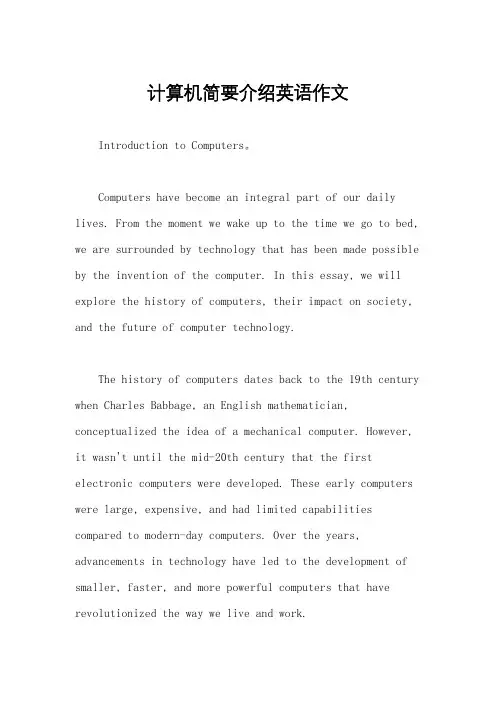
计算机简要介绍英语作文Introduction to Computers。
Computers have become an integral part of our daily lives. From the moment we wake up to the time we go to bed, we are surrounded by technology that has been made possible by the invention of the computer. In this essay, we will explore the history of computers, their impact on society, and the future of computer technology.The history of computers dates back to the 19th century when Charles Babbage, an English mathematician, conceptualized the idea of a mechanical computer. However, it wasn't until the mid-20th century that the first electronic computers were developed. These early computers were large, expensive, and had limited capabilities compared to modern-day computers. Over the years, advancements in technology have led to the development of smaller, faster, and more powerful computers that have revolutionized the way we live and work.The impact of computers on society has been profound. They have transformed the way we communicate, conduct business, and access information. The internet, which is made possible by computers, has connected people from all over the world and has made it possible to access a wealth of knowledge with just a few clicks. Computers have also revolutionized industries such as healthcare, education, and entertainment, making processes more efficient and accessible to a larger audience.Looking to the future, the possibilities for computer technology are endless. With the development of artificial intelligence and machine learning, computers are becoming increasingly intelligent and capable of performing complex tasks. This has the potential to revolutionize industries such as transportation, manufacturing, and finance. Additionally, the rise of quantum computing has the potential to solve complex problems that are currently impossible for traditional computers to solve.In conclusion, computers have had a profound impact onsociety and will continue to shape the way we live and work in the future. As technology continues to advance, the possibilities for computer technology are endless, and we can expect to see even more groundbreaking developments in the years to come.。
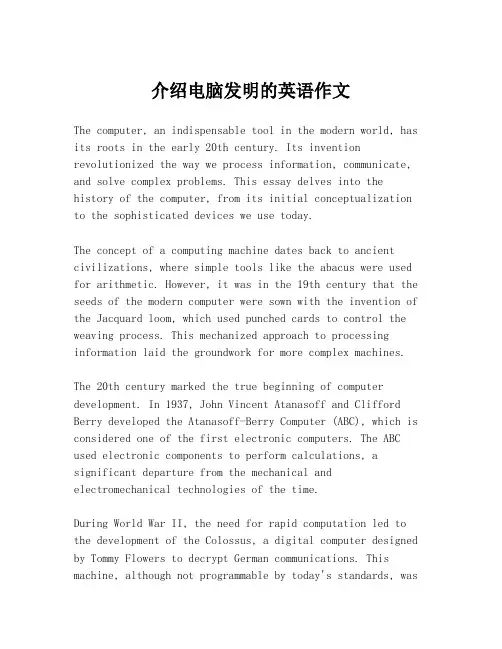
介绍电脑发明的英语作文The computer, an indispensable tool in the modern world, has its roots in the early 20th century. Its invention revolutionized the way we process information, communicate, and solve complex problems. This essay delves into the history of the computer, from its initial conceptualization to the sophisticated devices we use today.The concept of a computing machine dates back to ancient civilizations, where simple tools like the abacus were used for arithmetic. However, it was in the 19th century that the seeds of the modern computer were sown with the invention of the Jacquard loom, which used punched cards to control the weaving process. This mechanized approach to processing information laid the groundwork for more complex machines.The 20th century marked the true beginning of computer development. In 1937, John Vincent Atanasoff and Clifford Berry developed the Atanasoff-Berry Computer (ABC), which is considered one of the first electronic computers. The ABC used electronic components to perform calculations, a significant departure from the mechanical and electromechanical technologies of the time.During World War II, the need for rapid computation led to the development of the Colossus, a digital computer designed by Tommy Flowers to decrypt German communications. This machine, although not programmable by today's standards, wasa significant step towards the computers we know.The most pivotal moment in computer history came with the invention of the Electronic Numerical Integrator and Computer (ENIAC) in 1946 by John Mauchly and J. Presper Eckert. ENIAC was a giant machine that filled a room and was capable of performing complex calculations at unprecedented speeds. It was the first general-purpose electronic computer, marking the transition from mechanical to electronic computing.The 1950s and 1960s saw the rise of mainframe computers, which were large, expensive, and used by businesses and government agencies. These machines were the precursors to the personal computers that would become household items in the following decades.The 1970s brought about the microprocessor, which miniaturized the computer's core components onto a single chip. This innovation by Intel allowed for the creation of smaller, more affordable computers, paving the way for the personal computer revolution.The 1980s and 1990s were characterized by the proliferation of personal computers in homes and workplaces. Companies like IBM, Apple, and Microsoft played crucial roles in making computers accessible to the masses. The development of the graphical user interface (GUI) made computers more user-friendly, and the advent of the internet transformed theminto tools for global communication and information sharing.Today, computers have evolved into highly sophisticateddevices that are integral to every aspect of life. From smartphones and tablets to supercomputers and cloud computing, the evolution of the computer continues to shape the world in ways that were unimaginable in the early days of computing.In conclusion, the invention of the computer has been ajourney marked by innovation and the relentless pursuit of efficiency and accessibility. As we stand on the brink of new technological advancements like quantum computing andartificial intelligence, the legacy of the computer'sinvention continues to inspire and challenge us to push the boundaries of what is possible.。
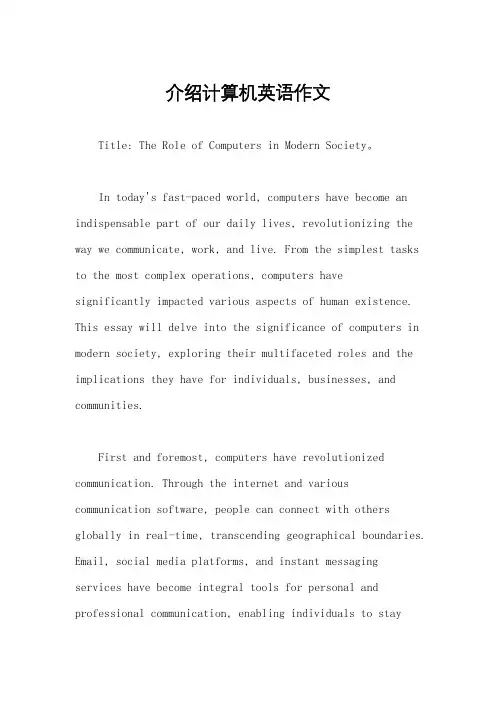
介绍计算机英语作文Title: The Role of Computers in Modern Society。
In today's fast-paced world, computers have become an indispensable part of our daily lives, revolutionizing the way we communicate, work, and live. From the simplest tasks to the most complex operations, computers havesignificantly impacted various aspects of human existence. This essay will delve into the significance of computers in modern society, exploring their multifaceted roles and the implications they have for individuals, businesses, and communities.First and foremost, computers have revolutionized communication. Through the internet and various communication software, people can connect with others globally in real-time, transcending geographical boundaries. Email, social media platforms, and instant messaging services have become integral tools for personal and professional communication, enabling individuals to stayconnected, share information, and collaborate regardless of distance.Furthermore, computers have transformed the way we work. In the business world, computer technology has streamlined processes, increased efficiency, and expanded opportunities for innovation. From automated manufacturing systems to sophisticated data analytics tools, computers have empowered organizations to optimize their operations, make data-driven decisions, and gain a competitive edge in the marketplace. Additionally, remote work has become increasingly prevalent, facilitated by the connectivity and flexibility afforded by computers, allowing employees to work from anywhere with an internet connection.Moreover, computers have revolutionized education. The integration of technology in classrooms has enhancedlearning experiences, making education more interactive, engaging, and accessible. Interactive whiteboards, educational software, and online resources have augmented traditional teaching methods, catering to diverse learning styles and fostering critical thinking skills amongstudents. Furthermore, e-learning platforms and online courses have democratized education, providing individuals with opportunities for self-paced learning and skill development regardless of their geographical location or socioeconomic background.In addition to communication, work, and education, computers have also had a profound impact on entertainment and leisure activities. From streaming services and online gaming to virtual reality experiences, computers have transformed the way we consume media and entertain ourselves. The advent of digital content creation tools has empowered individuals to express their creativity, share their passions, and connect with like-minded communities online. Furthermore, the rise of e-commerce platforms has revolutionized the way we shop, offering unparalleled convenience, choice, and accessibility to consumers worldwide.However, alongside the myriad benefits that computers bring, there are also challenges and concerns that must be addressed. Issues such as cybersecurity threats, dataprivacy breaches, and digital divide disparities underscore the need for responsible use and governance of computer technology. As our reliance on computers continues to grow, it is essential to prioritize cybersecurity measures, enact robust data protection regulations, and bridge the digital divide to ensure that everyone has equitable access to the opportunities afforded by technology.In conclusion, computers play an indispensable role in modern society, impacting various aspects of our lives from communication and work to education and entertainment. As we navigate the ever-evolving landscape of technology, it is crucial to harness the transformative power of computers responsibly, addressing challenges and maximizing benefits to create a more connected, inclusive, and prosperousfuture for all.。
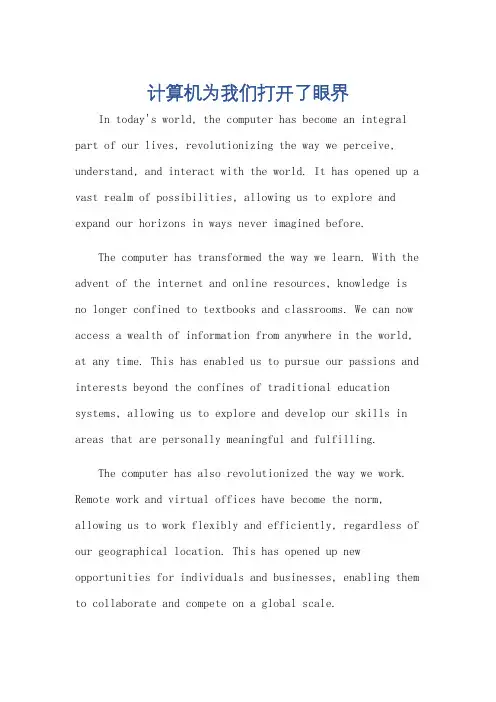
计算机为我们打开了眼界In today's world, the computer has become an integral part of our lives, revolutionizing the way we perceive, understand, and interact with the world. It has opened up a vast realm of possibilities, allowing us to explore and expand our horizons in ways never imagined before.The computer has transformed the way we learn. With the advent of the internet and online resources, knowledge is no longer confined to textbooks and classrooms. We can now access a wealth of information from anywhere in the world, at any time. This has enabled us to pursue our passions and interests beyond the confines of traditional education systems, allowing us to explore and develop our skills in areas that are personally meaningful and fulfilling.The computer has also revolutionized the way we work. Remote work and virtual offices have become the norm, allowing us to work flexibly and efficiently, regardless of our geographical location. This has opened up new opportunities for individuals and businesses, enabling them to collaborate and compete on a global scale.Moreover, the computer has enabled us to connect with people from diverse cultures and backgrounds. Social media and video conferencing tools have broken down barriers, allowing us to communicate and share ideas seamlessly. This has fostered a global community that is more interconnected and understanding than ever before.In addition, the computer has facilitated advancements in science, technology, and research. It has enabled scientists and researchers to analyze vast amounts of data, make discoveries, and develop new technologies that have improved our lives in countless ways.However, it is important to note that while the computer has opened up a world of possibilities, it also poses challenges and responsibilities. We must use technology ethically and responsibly, ensuring that it serves the betterment of society and does not lead to negative consequences.In conclusion, the computer has indeed opened our eyes to a new world of possibilities. It has revolutionized the way we learn, work, connect, and explore, allowing us to expand our horizons and achieve our dreams. However, wemust also approach this technology with caution and responsibility, ensuring that it serves the betterment of society and does not lead to unintended consequences.**计算机拓宽了我们的视野**在当今世界,计算机已经成为我们生活中不可或缺的一部分,它革命性地改变了我们感知、理解和与世界互动的方式。
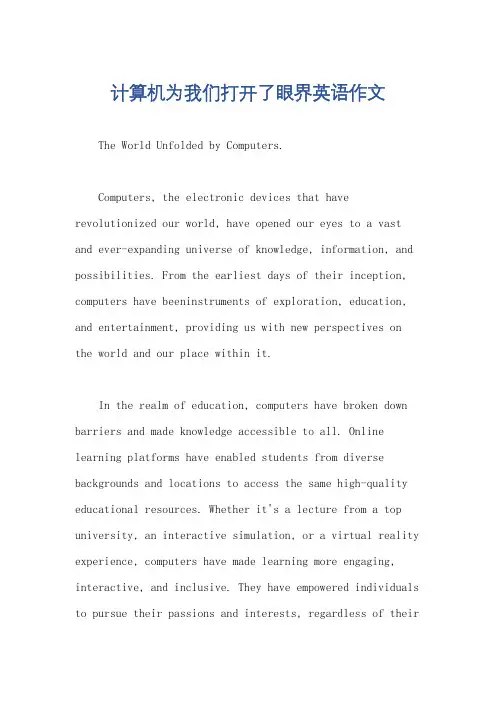
计算机为我们打开了眼界英语作文The World Unfolded by Computers.Computers, the electronic devices that have revolutionized our world, have opened our eyes to a vast and ever-expanding universe of knowledge, information, and possibilities. From the earliest days of their inception, computers have beeninstruments of exploration, education, and entertainment, providing us with new perspectives on the world and our place within it.In the realm of education, computers have broken down barriers and made knowledge accessible to all. Online learning platforms have enabled students from diverse backgrounds and locations to access the same high-quality educational resources. Whether it's a lecture from a top university, an interactive simulation, or a virtual reality experience, computers have made learning more engaging, interactive, and inclusive. They have empowered individuals to pursue their passions and interests, regardless of theirgeographical location or socioeconomic status.In the field of exploration, computers have enabled usto reach beyond the limits of our physical world. From mapping the depths of the ocean to studying the distant reaches of space, computers have provided the computational power and analytical tools necessary to process vast amounts of data and make sense of the unknown. They have allowed us to peer into the microcosmos of atoms and molecules, revealing the secrets of life and matter at its most fundamental level.In the world of entertainment, computers have transformed the way we consume and create art. Digitalmedia has blurred the lines between reality and imagination, enabling artists to create visually stunning works of art that were previously unimaginable. From animated films to virtual reality experiences, computers have provided a medium for artistic expression and storytelling that isboth immersive and interactive.Moreover, computers have facilitated globalcommunication and collaboration. The internet, a network of computers connected worldwide, has made it possible for people from different cultures and backgrounds to communicate and share ideas instantly. Social media platforms have allowed us to connect with friends and family, stay updated with news and events, and share our own stories and experiences with the world. Computers have also enabled remote work and collaboration, breaking down geographical barriers and allowing teams to work together effectively despite being physically apart.Beyond these obvious applications, computers have also had a profound impact on our cognitive abilities and ways of thinking. They have taught us to think critically, solve problems analytically, and adapt to changing situations flexibly. They have given us the tools to analyze vast amounts of data, make informed decisions, and innovate in ways that were previously impossible.In conclusion, computers have opened our eyes to a world that is vaster, more complex, and more interconnected than we could have imagined. They have empowered us toexplore, learn, create, and connect in ways that were previously unimaginable. As we continue to harness the power of computers and push the boundaries of technology, the opportunities and possibilities that lie ahead are truly limitless.。
计算机前景介绍英语作文Computers have come a long way since their invention, and the future looks incredibly promising. Let's talk about some of the exciting trends in the world of computing.First, AI and machine learning are revolutionizing the way we interact with computers. Imagine a world where your computer can understand your needs and preferences, and adjust accordingly. It's not just sci-fi anymore – these technologies are becoming a reality, and they're going to change everything from the way we shop to how we work.And let's not forget about quantum computing. This new branch of computing is going to take us into a whole new era of processing power. With quantum computers, we'll be able to solve problems that are currently beyond the reach of even the most powerful classical computers. It's going to be amazing to see what new discoveries and innovations this will lead to.But computers aren't just about getting faster and more powerful. They're also about accessibility. With the riseof cloud computing and edge computing, more and more people are able to access computing power no matter where they are. This means that even in remote areas, people can haveaccess to the same tools and resources as those in major cities.And finally, let's talk about sustainability. Computing has traditionally been a resource-intensive industry, but that's changing. With new technologies like green computing and energy-efficient hardware, we're starting to see ashift towards more sustainable practices. This is not only good for the environment, but it also makes good business sense in the long run.So, what does the future of computing look like? It's bright, exciting, and full of potential. With AI, quantum computing, accessibility, and sustainability all playing a role, we're sure to see some amazing developments in the coming years. Stay tuned!。
初识计算机英语作文范文标题,初识计算机(A First Encounter with Computers)。
在当今数字化的世界中,计算机已经成为了我们生活中不可或缺的一部分。
对于许多人来说,初次接触计算机可能是一次充满好奇和挑战的经历。
下面是一个人第一次接触计算机的故事,让我们一起来看看。
It was a bright and sunny morning when I first encountered a computer. I remember feeling a mix of excitement and apprehension as I sat down in front of the sleek machine, its screen glowing with possibilities. The keyboard looked daunting with its array of keys, each one representing a different function. With trembling fingers, I tentatively pressed the power button, and the computer hummed to life, displaying the familiar startup screen.As I navigated the mouse cursor around the screen, I felt like a pioneer exploring uncharted territory. The desktop was cluttered with icons representing variousprograms and applications, each one promising to unlock new capabilities. With a sense of wonder, I clicked on the internet browser icon and watched as the browser window opened, revealing a vast expanse of cyberspace waiting to be explored.My first task was simple yet exhilarating: sending an email. I clicked on the email program and was greeted by a blank message window. With some guidance from a helpful friend, I typed in the recipient's email address, composed a message, and clicked "send." The feeling of sending my first email was akin to sending a message in a bottle out to sea, unsure of where it would end up but hopeful that it would reach its destination.As I delved deeper into the world of computers, I discovered the power of word processing. With a word processor program open, I could type, edit, and format text with ease. No longer bound by the constraints of pen and paper, I could write and revise to my heart's content, watching my thoughts come to life on the screen before me.But perhaps the most transformative aspect of my first encounter with computers was the realization of their potential as tools for learning and discovery. With access to the internet, I could access a wealth of information on any topic imaginable. Whether I wanted to learn about history, science, or art, the answers were just a fewclicks away. Suddenly, the world felt smaller and more accessible, with knowledge and wisdom at my fingertips.Of course, my journey with computers was not withoutits challenges. There were moments of frustration and confusion as I grappled with error messages, software glitches, and technical jargon. But with each obstacle I encountered, I grew more determined to overcome it, knowing that the rewards of mastering this technology far outweighed the temporary setbacks.Looking back on that fateful day when I first encountered a computer, I am filled with gratitude for the opportunities it has afforded me. From staying connected with loved ones to pursuing my passions and interests, the computer has become an indispensable tool in my life. Andwhile I may never fully understand the inner workings of this marvel of modern technology, I am endlessly fascinated by its potential to shape the world around us.In conclusion, my first encounter with computers was a journey of discovery, filled with excitement, challenges, and endless possibilities. It opened my eyes to a world of knowledge and connectivity, forever changing the way I interact with the world around me. And as I continue to explore and innovate in this digital age, I am grateful for the role that computers play in enriching my life and expanding my horizons.。
电脑简介英文作文Title: Introduction to Computers。
Computers have become an indispensable part of modern life, revolutionizing the way we work, communicate, and entertain ourselves. In this essay, we will delve into the various aspects of computers, ranging from their history and components to their impact on society and future prospects.Firstly, let's explore the history of computers. The evolution of computers dates back to the mid-20th century when the first electronic computers were developed. These early computers were enormous machines that occupied entire rooms and were primarily used for complex calculations in scientific and military applications. However, with advancements in technology, computers became smaller, faster, and more accessible to the general public.Nowadays, computers come in various forms and sizes,catering to different needs and preferences. From desktop computers to laptops, tablets, and smartphones, there is a wide array of devices available to suit every requirement. Each type of computer has its unique features and capabilities, allowing users to perform a multitude of tasks efficiently.Next, let's delve into the components of a computer. At the heart of every computer is the central processing unit (CPU), which acts as the brain of the system, executing instructions and performing calculations. The CPU is accompanied by other essential components such as random-access memory (RAM), which temporarily stores data and instructions for quick access, and storage devices like hard disk drives (HDDs) or solid-state drives (SSDs), which store data permanently.Furthermore, computers are equipped with input and output devices that enable communication with the user. These include keyboards, mice, touchscreens, and displays, through which users interact with the computer and receive feedback. Additionally, computers may have various portsand connectors for connecting external devices such as printers, scanners, cameras, and networking equipment.One of the most significant impacts of computers on society is their role in facilitating communication and information exchange. The internet, which is accessed through computers and other devices, has revolutionized the way we communicate, allowing instant communication across vast distances through email, social media, and messaging platforms. Moreover, the internet serves as a vastrepository of information, enabling users to access knowledge on virtually any topic with just a few clicks.Computers have also transformed various industries, including education, healthcare, finance, and entertainment. In education, computers are used for research, interactive learning, and online courses, enhancing the learning experience for students worldwide. In healthcare, computers aid in diagnosis, treatment planning, and medical record-keeping, leading to improved patient care and outcomes. Similarly, in finance, computers facilitate transactions, data analysis, and risk management, contributing to theefficiency and stability of financial markets. In the entertainment industry, computers are used for creating digital content, such as movies, music, and video games, offering endless possibilities for creativity and entertainment.Looking ahead, the future of computers is filled with exciting possibilities. Advancements in artificial intelligence (AI), machine learning, and quantum computing are poised to revolutionize the capabilities of computers even further. AI-powered systems are already making strides in areas such as autonomous vehicles, natural language processing, and medical diagnostics, with the potential to transform industries and society at large. Similarly, quantum computing holds the promise of solving complex problems that are currently intractable for classical computers, leading to breakthroughs in fields such as cryptography, drug discovery, and materials science.In conclusion, computers have come a long way since their inception, evolving from bulky machines to sleek and powerful devices that permeate every aspect of our lives.With their ability to process information, communicate, and solve complex problems, computers have become indispensable tools in the modern world. As we continue to push the boundaries of technology, the possibilities for the future of computers are boundless, holding the potential to shape the world in ways we can only imagine.。
给老人介绍电脑作文英文Title: Introducing Grandpa to the World of Computers: A Journey into the Digital Realm。
1. Embrace the Future, Grandpa!Imagine this, dear Grandpa, not too long ago, a magical device called a computer appeared in our lives. It's not a toy, but a portal to a world of endless possibilities. Just like a new toy, it's full of surprises!2. A Click, a Touch, a Connection。
Imagine touching a flat surface with your fingers, and suddenly, it comes alive with colors and sounds. This "screen" is like a magic mirror, showing you the world without leaving your chair. It's like holding a magic book, but it's alive!3. The World at Your Fingertips。
Think about the internet, Grandpa. It's like a library, but it's not just books. You can learn about anything, from cooking your favorite dish to finding the best weather forecast. It's a world of information at your fingertips, just a click away!4. Communication, No Distance。
介绍一个电脑英语作文几句话Computers have become an integral part of our daily lives, revolutionizing the way we work, learn, and communicate. In the realm of education, the integration of computers has had a profound impact, particularly on the way we approach writing and the composition of English essays. In this essay, I will introduce the concept of a computer-based English essay and discuss its benefits and potential challenges.The computer-based English essay is a form of academic writing that utilizes digital tools and technologies to enhance the writing process. Unlike traditional pen-and-paper essays, the computer-based essay allows students to leverage the power of word processors, research databases, and online collaboration platforms to streamline their writing tasks. This approach offers several advantages that can significantly improve the quality and efficiency of the essay-writing experience.One of the primary benefits of the computer-based English essay is the ease of editing and revising. With a word processor, students canseamlessly make changes, rearrange paragraphs, and refine their writing without the hassle of rewriting entire sections. This flexibility encourages a more iterative and reflective writing process, enabling students to experiment with different ideas and structures until they arrive at the most effective and polished final product.Moreover, the computer-based essay facilitates the integration of multimedia elements, such as images, videos, and hyperlinks. These digital resources can enhance the essay's content, providing visual aids, supporting evidence, and additional context that can deepen the reader's understanding of the topic. By incorporating multimedia, students can create a more engaging and interactive essay that goes beyond the traditional text-based format.Another significant advantage of the computer-based English essay is the ease of research and information gathering. With access to online databases, academic journals, and search engines, students can quickly and efficiently gather relevant sources to support their arguments and ideas. This streamlined research process allows students to spend more time analyzing and synthesizing information, rather than simply collecting it.The computer-based essay also enables seamless collaboration and peer review. Using online platforms and document-sharing tools, students can easily share their work with classmates, instructors, andwriting tutors, who can provide valuable feedback and suggestions for improvement. This collaborative approach fosters a learning environment where students can learn from each other, refine their writing skills, and receive targeted guidance to enhance the quality of their essays.Furthermore, the computer-based essay format aligns with the digital-native skills and preferences of many modern students. Raised in an era of ubiquitous technology, these students are often more comfortable and proficient in navigating digital tools and platforms. By embracing the computer-based essay, educators can better engage and cater to the learning styles and preferences of their students, ultimately enhancing their academic performance and overall learning experience.However, it is important to acknowledge the potential challenges and drawbacks of the computer-based English essay. One significant concern is the risk of technological glitches or system failures, which could result in the loss of valuable work or disrupt the writing process. To mitigate this risk, students must develop effective backup and file-management strategies to ensure the safety and security of their work.Another challenge is the potential for increased distractions and procrastination. With the abundance of online resources and digitaltemptations, students may find it more challenging to maintain focus and discipline during the writing process. Educators must work to instill effective time-management skills and encourage students to establish a structured writing environment that minimizes these distractions.Additionally, there are concerns about the potential for over-reliance on digital tools and the potential erosion of traditional writing skills, such as handwriting and the ability to compose thoughts without the aid of a computer. Educators must strike a balance between embracing the benefits of computer-based essays and ensuring that students maintain a well-rounded set of writing skills.Despite these challenges, the computer-based English essay remains a valuable and innovative approach to academic writing. By leveraging the power of technology, students can enhance their writing process, improve the quality of their essays, and develop essential digital literacy skills that will serve them well in their academic and professional pursuits.As we move forward, it is crucial for educators to continuously evaluate and refine the implementation of computer-based essays, addressing the challenges and capitalizing on the opportunities presented by this evolving approach to writing. By doing so, we canempower our students to become more effective, efficient, and engaging communicators in the digital age.。